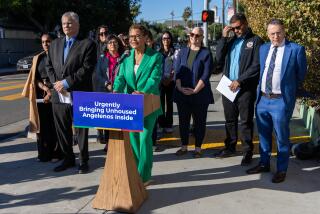Editorial: Trying to house L.A.’s homeless veterans is a complex, lengthy process
As we honor the dead on this Memorial Day, it’s worth remembering as well the living veterans of military service who have no homes except sidewalk encampments or the occasional shelter bed, whose lives are so wracked by mental illness, addictions or physical disabilities that they are essentially dying in the streets.
At an event in Los Angeles last year, Michelle Obama challenged mayors across the country to house homeless veterans by the end of 2015, and Mayor Eric Garcetti was one of many who pledged to do so. The problem is that the population of homeless veterans in L.A. has increased since then. Although the number fluctuates daily as some fall into and out of housing and others become newly homeless, Garcetti’s office now says the city needs to house 3,154 homeless veterans by the end of the year.
We could say it was foolish of the mayor to assign himself the goal of housing an unknown number of people by a specific date. But he reasoned that a deadline would create a sense of urgency. In fact, the city did wrangle Veterans Affairs vouchers for supportive housing sooner than usual this year. It also helps that the VA is under its own deadline — not just to fulfill the Obama administration’s goal but to comply with a legal settlement by securing more housing for veterans on its West L.A. campus and in communities across the county.
So what must Garcetti and VA officials do? First, find veterans who are homeless. Some do show up at the VA or on service providers’ doorsteps, but most are on the streets. The city and the VA, to their credit, are increasing the number of outreach workers to coax veterans into the system.
And it is a system. Housing homeless veterans — or anyone who is homeless — is not as simple as handing over a set of keys. (Although some advocates say it should be.) It’s a lengthy process. And it should be shorter.
It can take 100 days, sometimes longer, for a veteran to go from first contact with a provider to walking across the threshold of an apartment. He or she must be confirmed to be a veteran — with an honorable or general discharge — to receive a Veterans Affairs Supportive Housing (VASH) voucher. That process, which can take weeks, should be streamlined. A veteran waiting through all that is still homeless.
The good news, according to city officials, is that about 1,000 VASH vouchers and another 500 federal housing vouchers are available this year. That should be enough to cover most if not all of the chronically homeless — those who have been homeless at least a year and have a disabling problem. VASH vouchers are accompanied by case management and services provided by the VA or its nonprofit partners. Some landlords, however, are reluctant to accept a homeless person who might turn out to be an unstable tenant. And although the vouchers cover up to 110% of what the U.S. Department of Housing and Urban Development considers a fair market rent for the area, the booming rental market and scarcity of affordable housing in Los Angeles make it even harder to find a willing landlord.
City and VA officials can work on allaying landlords’ fears by making sure that they know how to contact tenants’ case managers if there are problems. The city could also help fund more housing “navigators” — specialists who find available rental units for veterans and work with landlords. City officials are also looking into fundraising for security deposits on apartments. Housing vouchers don’t cover them.
Most of the city’s homeless veterans are not chronically homeless, and so are not eligible for vouchers. But these veterans are eligible for the Supportive Services for Veteran Families Program, which helps newly homeless veterans get back on their feet, rent apartments and find jobs. This year, the VA gave $30 million to L.A. nonprofits under this program — twice as much as it last awarded, in 2013.
Of course, it’s unclear whether all of these resources are enough to end veteran homelessness this year — or the next, for that matter. But the mayor has infused this issue with a sense of urgency and put a homelessness expert on his staff who convenes monthly meetings of all the agencies involved. That’s a start. Now, he needs to work on infusing the city with more affordable housing.
Follow the Opinion section on Twitter @latimesopinion and Facebook
More to Read
Start your day right
Sign up for Essential California for news, features and recommendations from the L.A. Times and beyond in your inbox six days a week.
You may occasionally receive promotional content from the Los Angeles Times.






